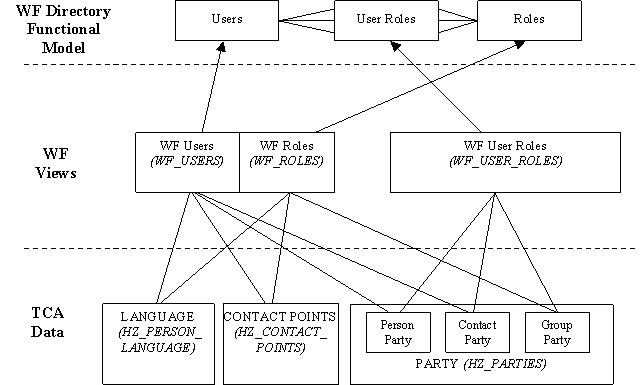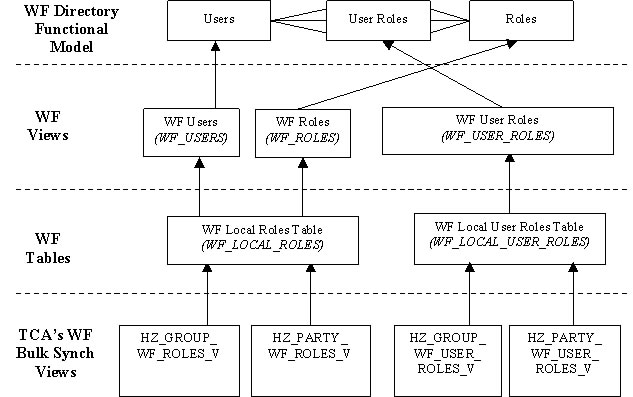
Oracle Workflow (WF) automatically performs an initial synchronization of the user
and role information in all the related originating systems during installation.
For Oracle Trading Community Architecture (TCA), a patch automatically synchronizes
that information with the information in the Workflow local tables on an incremental
basis, using the Workflow local synchronization APIs
Oracle Workflow references user and role information through three views based on the
database tables that make up the Workflow Directory repository.
• WF_USERS
• WF_ROLES
• WF_USER_ROLES
For more information, see: Synchronizing Workflow User and Role Information, in
Setting Up an Oracle Workflow Directory Service, Oracle Workflow Administrator's Guide.
Run the Synchronize WF LOCAL Tables program to perform synchronization in bulk. Use this concurrent program as an interim
method to synchronize the Workflow local tables with the user and role information
stored in the TCA tables until TCA performs the synchronization automatically.

The Workflow views are views on two Workflow tables: WF_LOCAL_ROLES and
WF_LOCAL_USER_ROLES. For TCA views, both bulk and incremental synchronizations write to these Workflow tables.

Quality Management Overview
Oracle Trading Community Architecture Data Quality Management (DQM) is a set of
tools and features that provide powerful searching and matching functionality for
search, duplicate identification, duplicate prevention, and other data management
features.
One or more TCA records failed to synchronize. Run the DQM
Setup - Detailed diagnostic report for more information.
The DQM synchronization method is set to: <method>.
Staged Schema The staged schema is a separate set of database tables with a portion of the data from
the TCA Registry that transformations have standardized for improved matching.
Prerequisites (these are pretty much already done unless you are actually using this, then you might want to look at it)
Before you submit the DQM Staging program, you must define attributes and
transformations. See: Defining Attributes and Transformations, page 5-22.
STAGE_ALL_DATA Stage all data, create indexes, and generate
map procedures: To stage all data, create
indexes, and generate mapping procedures.
Index Creation Tablespace: Enter the table space where the interMedia indexes are
to be created in.
Use the DQM Index Optimization program to optimize interMedia indexes. You should run this program once in a
while, but frequent optimization is not mandatory.
The DQM Synchronization program, however, synchronizes data between the TCA
Registry and the staged schema, so you should run this program as often as possible to
keep the search results accurate.
DQM Synchronization Method - Automatic: Batch:
DQM setup:
Assign:
Trading Community Manager: - Access to all TCA features, with view-only
privileges for Data Sharing and Security (DSS) administration.
& TCA Data Security Administrator -Administration privileges for Data Sharing and
Security. Assign this responsibility along with Trading Community Manager to
users who need to administer DSS.
Please run the DQM Staging program with parameter STAGE_ALL_DATA to create the staged schema and intermedia indexes used in DQM.
After this is complete, the DQM Serial Sync Index Concurrent Program should complete successfully.
Prerequisites
Before you submit the DQM Staging program, you must define attributes and
transformations. See: Defining Attributes and Transformations, page 5-22.
Trading Community->DQM – Attributes and Transformations
Program Parameters
• Number of Parallel Staging Workers:
• Staging Command: STAGE_ALL_DATA
Stage all data, create indexes, and generate
map procedures: To stage all data, create
indexes, and generate mapping procedures
Staging program that did not finish. Enter No to run a new DQM Staging program.
• Index Creation Tablespace: Enter the table space where the interMedia indexes are
to be created in. Tablespace: APPS_TS_TX_IDX
• Index Creation: Enter PARALLEL to generate multiple indexes at the same time,
based on the number of parallel workers that you specified. Enter SERIAL to create
indexes one after another, even if you specified parallel workers.
DQM Index Optimization Program
schedule this program to run on a periodic basis. You should run this program once in a
while, but frequent optimization is not mandatory.
Prerequisites
Before you submit the DQM Index Optimization program, you must make sure that
both the staged schema and interMedia indexes exist.
Registry and the staged schema, so you should run this program as often as possible to
keep the search results accurate. See: DQM Synchronization Program, page 5-61.
Staged Schema, page 5-56
DQM Synchronization Method
Automatic:
Batch: Schedule the DQM Synchronization program to periodically run. See: DQM
Synchronization Program, page 5-61
The DQM Synchronization program,
DQM Staging Program
Run dqm staging program
Number of Parallel Staging Workers:
Staging Command: STAGE_ALL_DATA
Continue previous execution: - no
Index Creation Tablespace:: APPS_TS_TX_IDX
Index Creation:: serial
Indexes created:
index_owner is AR
Error syncing hz_stage_party_sites_t1 :ORA-20000: Oracle Text error:
DRG-10502: index AR.HZ_STAGE_PARTY_SITES_T1 does not exist
Error syncing hz_stage_contact_t1 :ORA-20000: Oracle Text error:
DRG-10502: index AR.HZ_STAGE_CONTACT_T1 does not exist
Error syncing hz_stage_cpt_t1 :ORA-20000: Oracle Text error:
DRG-10502: index AR.HZ_STAGE_CPT_T1 does not exist
Error syncing hz_stage_parties_t1 :ORA-20000: Oracle Text error:
DRG-10502: index AR.HZ_STAGE_PARTIES_T1 does not exist
Fix:
Run the DQM Staging program with parameter STAGE_ALL_DATA to create the staged schema and intermedia indexes used in DQM.